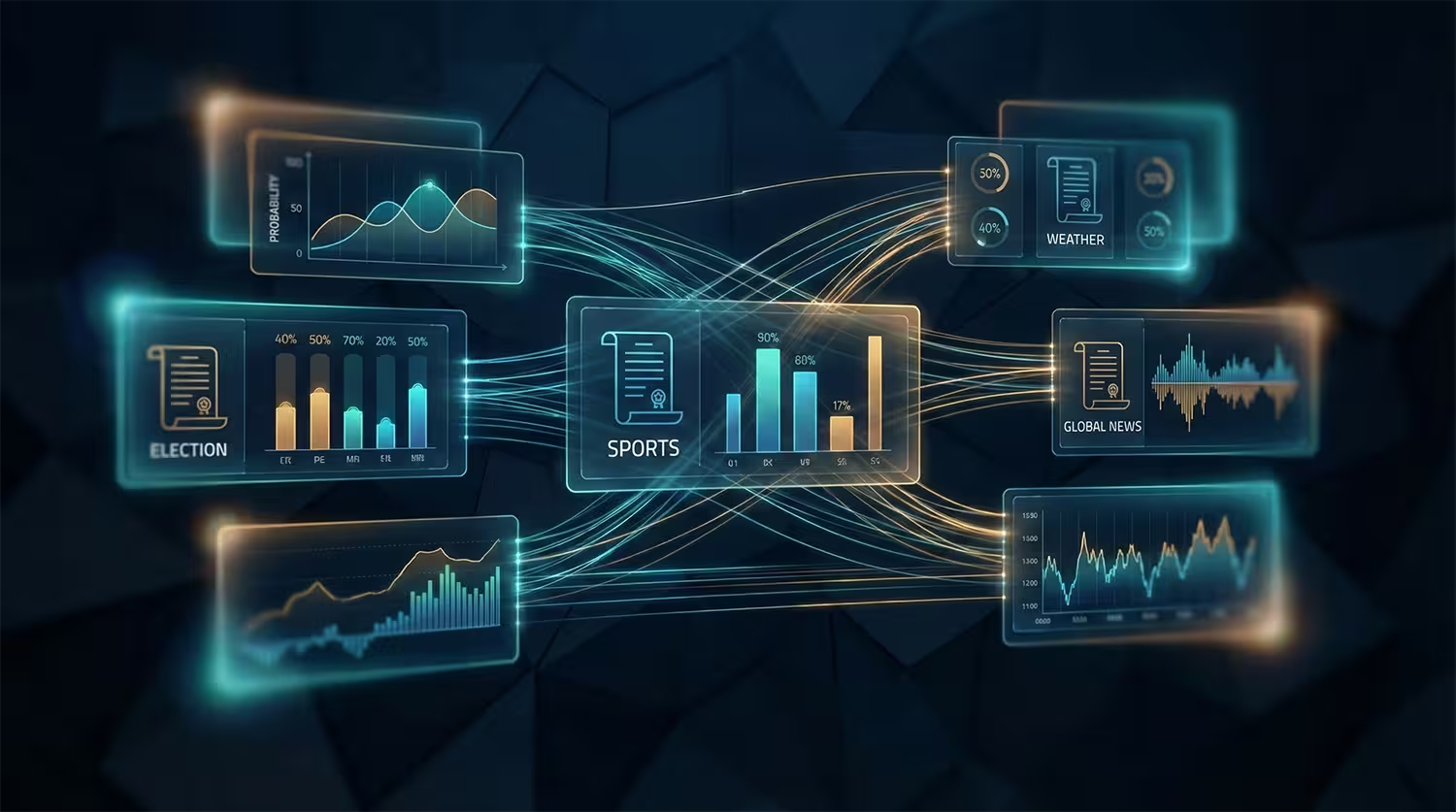Behind the Scenes: How Sportsbooks Use AI to Set Odds

Betting lines are not static—they never have been and never will be. They change throughout the day—sometimes within seconds of a lineup change, and others after a rush of action hits the board.
What’s behind the changes isn’t only a team of human beings anymore. The humans are still there, but they’re getting help from AI in the decision-making process.
Almost all major sportsbooks are now relying on AI to process the massive amounts of data, track market activity, and fine-tune odds in real time. The systems get historical stats, scan for news on injuries, weather updates, and clock social media sentiment to update pricing, and it does it faster than the humans.
How does it work? How are sportsbooks using AI to set and adjust odds, what tools are they using, and why are lines more methodical? And are they getting harder to beat? Where does human judgment fit into the picture, and what does the future of AI-powered betting look like? Let’s tackle the robots and pray they don’t become sentient.
Traditional Oddsmaking vs. AI-Powered Models
Before sportsbooks began to integrate AI, odds were set by teams of traders and analysts, aka oddsmakers. They looked at stats, historical matchups, injuries, weather, and betting trends. A lot of it came down to experience, and people who knew the sport and the market were setting a number that they thought was fair, and then adjusting it based on how bettors reacted.
And while this approach still works, it does have its limits. It’s slower. It depends solely on a small group of people spotting patterns and reacting in real time. And when hundreds of games are happening across different sports? It’s almost impossible to keep up.
AI changed this. With modern machine learning models, sportsbooks are now able to process data from thousands of games, players, and betting markets at the same time. The system can update odds automatically based on real-time inputs, like injury news, sharp action, or an influx of betting volume.
Most sportsbooks use a mix of people and artificial intelligence. AI is in charge of the fast updates and constant number crunching, and the human oddsmakers still are in charge of judgment calls, especially on big sports events or unusual markets. One isn’t replacing the other; it’s a combined effort of both to cover more ground, faster and more accurately.
The Core AI Tools Sportsbooks Use
The main AI tools handle three big jobs: collecting data, running simulations, and reacting to betting activity.

Data Ingestion Pipelines
This is the system that pulls in raw data from dozens of sources—score feeds, injury reports, betting activity, news outlets, weather APIs, and more. It’s how sportsbooks keep their models updated in real time. Without this setup? The AI would have nothing current to work with.
It’s akin to a giant funnel that collects everything happening in the sports world and sends it right into the algorithms.

Algorithmic Simulations
Once all of that data is in, AI runs thousands—or millions—of simulations to figure out how a game could play out. It’s not guessing, either: it’s based on inputs like team strength, player performance, injuries, and historical outcomes.
The results help to set point spreads, totals, prop lines, and alternate markets. It’s how the book gets a feel for the full range of possible outcomes, and what the most likely results will be.

Market Reaction Analysis
This tracks how bettors are reacting to the lines. If too much money is coming in on one side, the AI flags it. It could be casual money, or it might be sharp action; either way, the system adjusts odds to protect the book.
It’s also used to watch competitor books. If DraftKings moves a line and FanDuel doesn’t, market analysis tools will suggest syncing up quickly in order to avoid exposure.
How The AI Tools Work
- Data Ingestion Pipelines: Pull in live data from games, news, injuries, weather, and bets to feed the AI models.
- Algorithmic Simulations: Run thousands of simulated game outcomes based on real-time inputs to help price bets.
- Market Reaction Analysis: Monitor how bettors and other sportsbooks move, and then adjust lines to limit their risk.
Real-Time Line Adjustments: How AI Reacts to Market Behavior
The moment that betting money starts leaning too far one way, sportsbooks aren’t sitting on their hands (the humans have hands, AI does not). The handless AI gets to work. It’s constantly scanning the flow of wagers and looking for patterns, like who’s betting, how much, and how fast lines are moving elsewhere.
If an influx of bets hits the spread for one team, odds can tighten or change in seconds, and it’s not because someone panicked, but because the system is programmed to limit all risk. The goal? Balance the action on both sides so the house doesn’t get caught paying out too much, no matter who wins.
You can see this play out on NFL Sundays during football season. If social media gets wind of a leak that a starting QB tweaked something in warmups? Sportsbooks that use AI aren’t waiting around for an official report. They’ll have already adjusted the odds based on bettor behavior and early movement, sometimes before fans have a chance to refresh their app.
Public vs. Sharp Money Detection
Sportsbooks don’t only care who’s betting—they care how they’re betting. And AI is the tool that they use to figure that out.
- If someone makes a large bet right when the line opens, or keeps hitting numbers that move in their favor, AI clocks it. It then starts to build a profile: this bettor knows what they’re doing. Once a few of those bets land, the odds usually don’t stay put for long.
- Compare that to a flood of casual bets; smaller ones that are made right before kickoff, and usually on the favorite. AI sees those too, but treats them way differently. The system doesn’t freak out, it just tweaks the line enough to stay ahead without overcorrecting.
This is how closing lines get sharper! They react more to informed bets than emotional ones. The goal is to protect the book from getting hit by people who know what they’re doing. And now, AI has the ability to make that separation faster than any human team ever could.
AI and Risk Management
Sportsbooks use AI to keep risk in check from the time a line goes live. How? By crunching incoming bets, comparing them to existing exposure, and adjusting the odds if things start veering too far in one direction.
They also run simulations in the background with thousands of possible outcomes based on current betting activity. That gives the book a heads-up on where things could go wrong and how much liability they have.
AI also flags behavior that might signal abuse. If someone is consistently sniping mispriced lines or pounces on promotions with amazing timing, the system can tag the account for review. Same goes for coordinated betting patterns across multiple accounts.

It’s an around-the-clock team that’s scanning for anything that threatens a sportsbook’s bottom line.
Case Studies: AI in Action
AI is already a main component of how sportsbooks operate, even if most bettors don’t know it! Below are two examples of how it’s used.
FanDuel and DraftKings Use AI for Player Props
At FanDuel and DraftKings, AI is being utilized to adjust prop bets as any and all new info comes in. If a player is dealing with a minor injury or a defensive matchup changes, the systems don’t wait for someone to manually update the lines. They recalculate expected stats, check for betting patterns, and tweak numbers based on how the market’s moving. You’ll see a points total shift or a price change within minutes of a team update, and that’s not a human doing it; it’s the algorithm keeping the books tight.
Live Adjustments On NFL Sundays
NFL Sundays are when the real-time systems get put to work. During pregame warmups, if a player is limping, AI tools scan everything from team sheets to social posts to beat writer blurbs. That triggers line movement instantaneously. It doesn’t wait for a formal report, as it wants to stay ahead of the action before it turns into a liability. Odds shift quickly because the model’s designed to act before large bets come pouring in—it doesn’t want to be caught off balance.
Controversies & Limitations
As scarily powerful as AI is, of course, it has controversies, and there are limitations to what it can do!
- Tougher to Beat the Book: Because algorithms are adjusting odds in real time, finding soft lines has become a lot harder. There’s less margin for human error when the pricing is handled by machines.
- Built-In Bias: AI models rely on historical data. If that data is flawed, outdated, or skewed? The predictions can follow the same pattern. That means AI can miss unexpected outcomes or overvalue trends that don’t hold up to scrutiny.
- Ethical Concerns: There are concerns that AI reacts faster than teams or players can communicate injury news, and that gives sportsbooks an advantage before the public knows what’s happened.
The Future of AI in Sportsbooks
Sportsbooks are starting to use AI for more than pricing odds. They’re exploring models that anticipate how bettors are likely to act, like if they are chasing losses, switching markets, or leaning toward certain types of bets. Odds could become more tailored, adjusting to individual preferences and past betting patterns.
Microbetting is another area that’s getting a tech upgrade. AI is able to process in-game stats and player data fast enough to support wagers on things like the next pitch or free throw. That kind of instant betting relies on fast, reliable machine analysis.
And then there’s the rise of generative AI. Some platforms are experimenting with tools that write automated odds breakdowns, explain bets in basic language, or recommend bets in real time based on trends. It’s not only on the backend; AI could soon be helping you choose what you bet on next.
Conclusion: Betting in an AI World: What You Need to Know
Toto? We aren’t in Kansas anymore, and you’re not betting in 2005. Algorithms are reading headlines, scanning social feeds, and reacting to bet slips faster than any human is capable of. It doesn’t mean that you’re outmatched, but it does mean you have to know what you’re up against.
Look below for a quick recap of what we covered:
- AI is constantly adjusting odds that are based on data that you might not see or be aware of.
- News breaks, lines move, and the window for real value doesn’t stay open for long.
- The best bettors use tools that help them move faster and think more critically.
If you want to keep up with AI, you should use AI-powered tools like the one we have here!

Alyssa contributes sportsbook/online casino reviews, but she also stays on top of any industry news, precisely that of the sports betting market. She’s been an avid sports bettor for many years and has experienced success in growing her bankroll by striking when the iron was hot. In particular, she loves betting on football and basketball at the professional and college levels.








